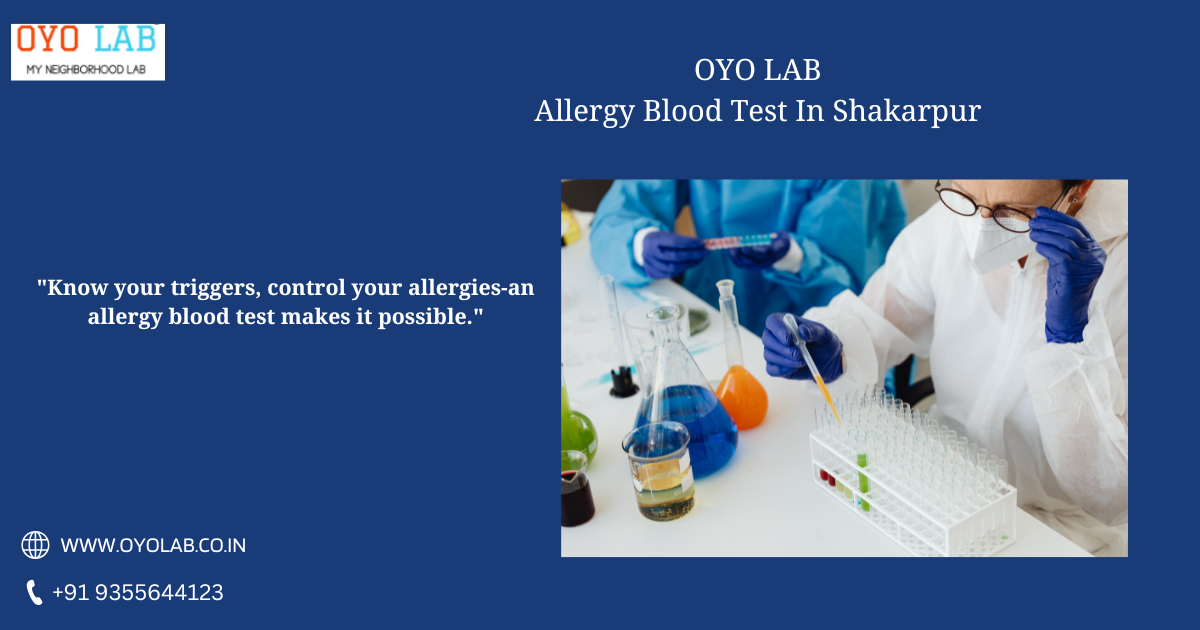
Allergy Blood Test In Shakarpur
By Shilpa | March 25, 2025
What Is Allergy Blood Test ?
An Allergy Blood Test is a diagnostic test used to detect allergic reactions by measuring the levels of specific antibodies, called immunoglobulin E (IgE), in the blood. These antibodies are produced by the immune system in response to allergens such as pollen, pet dander, certain foods, or insect stings.
Who Should Get an Allergy Blood Test?
You should consider getting an allergy blood test if:
-
You experience frequent allergy symptoms like sneezing, rashes, or difficulty breathing.
-
You have unexplained allergic reactions to food, medication, or environmental factors.
-
You have a family history of allergies and want to determine your risk.
Importance Of Allergy Blood Test
An Allergy Blood Test is crucial for diagnosing allergies and managing allergic conditions effectively. Here’s why it matters:
1. Identifies Allergy Triggers
-
Helps determine specific allergens (e.g., pollen, dust mites, food, pet dander).
-
Aids in avoiding exposure to triggers, reducing allergic reactions.
2. Safer for Certain Individuals
-
Suitable for people who cannot undergo skin prick tests (e.g., those with skin conditions like eczema or psoriasis).
-
Ideal for individuals on medications (e.g., antihistamines or steroids) that interfere with skin tests.
3. Helps Manage Severe Allergies
-
Useful in diagnosing anaphylaxis risks, such as severe reactions to food (nuts, shellfish) or insect stings.
-
Supports doctors in prescribing emergency treatments like epinephrine (EpiPen).
4. Useful for Children and Infants
-
Less discomfort compared to skin tests, making it a good choice for young children.
5. Provides a Broad Overview of Allergic Sensitivity
-
Measures total IgE levels (overall allergy sensitivity).
-
Identifies multiple allergies in a single test.
Benefits Of Allergy Blood Test
1. Accurate Identification of Allergens
This test helps pinpoint specific allergens, such as pollen, pet dander, dust mites, food, and insect venom, enabling targeted treatment.
2. Safer Alternative to Skin Tests
For individuals with severe allergies, a skin test might trigger an intense reaction. A blood test eliminates this risk by analyzing allergens in a controlled environment.
3. Suitable for All Ages
Unlike skin tests, which may be uncomfortable for young children and older adults, allergy blood tests are safe and suitable for all age groups.
4. Convenient and Non-Invasive
The procedure involves a simple blood draw, making it a less invasive alternative to skin prick tests, which require multiple allergen exposures.
5. Helps in Managing Chronic Conditions
Allergy-related conditions such as asthma and eczema can worsen due to unidentified allergens. Knowing specific triggers allows for better management and symptom control.
6. Effective for Food Allergy Detection
Food allergies can be life-threatening. Allergy blood tests help identify food sensitivities and allergies, enabling individuals to make informed dietary choices.